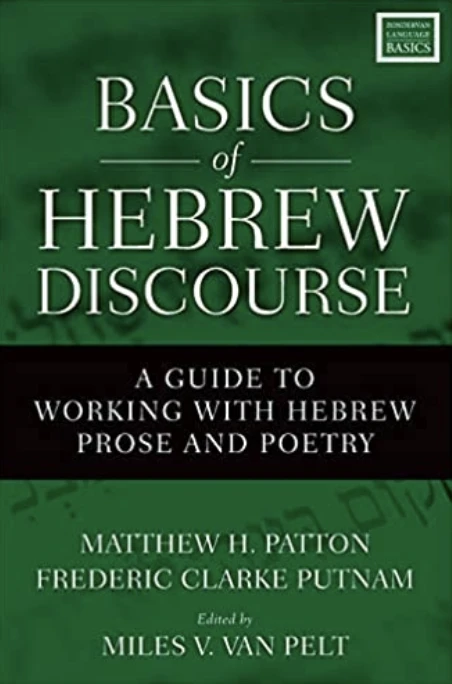
Matthew H. Patton and Frederic Clarke Putnam
Reviewed by: Jeremiah W. Montgomery
Basics of Hebrew Discourse: A Guide to Working with Hebrew Prose and Poetry, by Matthew H. Patton and Frederic Clarke Putnam. Zondervan, 2019. Paperback, 288 pages, $21.70 (Amazon). Reviewed by OP pastor Jeremiah W. Montgomery.
Thorough reading is no easy task—especially in a foreign language. The cues we expect from our mother tongue are often missing, and those provided by the new language are often missed. In conversation, the results can be amusing. But in exegesis, the consequences can be disastrous.
Patton and Putnam’s book aims to equip intermediate-level students with the tools necessary to engage the Hebrew Bible on its own terms. Its focus is on “discourse analysis,” defined as “the study of the meaningful relationships that exist between individual clauses” to express logical connections and produce units of text (11–12). This volume is actually two books under one cover, each with a separate table of contents: a treatment of Hebrew prose written by Patton (25–144), and a treatment of Hebrew poetry written by Putnam (145–269). I used Patton’s portion of the book during a recent MTIOPC Hebrew refresher course, and so the remainder of this review focuses on it.
There are many strengths to Patton’s work. He carefully defines important terms and concepts, and does so using English examples (ch. 2)—a brilliant stroke that allows readers to get oriented with the grammar before the language becomes Oriental. As he subsequently unpacks the elements of Hebrew prose (chs. 3–6), he continues to provide an English translation for each Hebrew example, allowing readers to focus on the point he makes without getting stuck on parsings. Concluding chapters draw the preceding elements together into a single, unified process (ch. 7) with extensive examples (ch. 8). I especially appreciated the final summary chart (ch. 9) that can be laid open on the desk side by side with one’s Hebrew text.
Though meticulous with his content, Patton remains refreshingly humble with his conclusions: “Good reading is not mechanical but relies on balanced, sympathetic attention to all kinds of contextual clues” (97). He even includes an example where contextual factors override other grammatical and discourse considerations (107)! Nevertheless, throughout the text he convincingly demonstrates a key insight: more often than not, Hebrew “conveys discourse relationships through verbal sequences and alterations in word order, features not as salient in English” (111–12).
Students of Hebrew who wish to get a better handle on how discourse analysis factors into translation and interpretation will find much that is useful in this book. Patton’s final sentence is a fitting conclusion to this review: “Even if it cannot resolve all these difficulties, discourse analysis fruitfully disciplines us to move beyond the sentence to the text as a whole in our search for meaning” (138).
June 01, 2025
Anxiety: Finding the Better Story
May 25, 2025
April 27, 2025
The Devoted Mind: Seeking God’s Face in a World of Distraction
April 20, 2025
April 13, 2025
Suffering: God’s Purpose in Our Pain
April 06, 2025
Sunday Matters: 52 Devotionals to Prepare Your Heart for Church
March 30, 2025
© 2025 The Orthodox Presbyterian Church